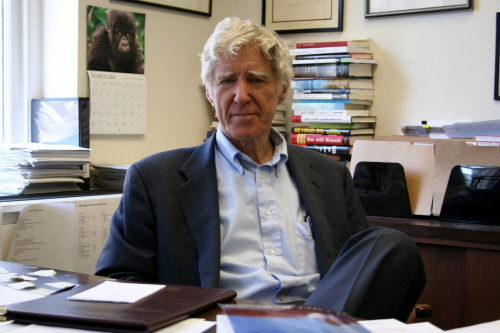
Please note: Earth Policy Institute provided me with a free review copy of Breaking New Ground.
I’ve been reading Lester Brown’s work for about ten years now, and in the process of doing so, I’ve developed a picture of the man: some of ideas gleaned from book cover jackets, but most of them from my own imagination. I’ve always thought that he was probably someone with a traditional academic background: the Ph.D. (I’ve referred to him as “Dr. Brown” in email exchanges with Earth Policy Institute), the professorships, the books and honorary degrees. In the latter cases, I’m right, but Brown’s life history is quite different from most scholars that I know. A product of a New Jersey farming parents who had only elementary school educations? A tomato farmer himself? A wrestler, and long-distance runner? OK, those didn’t fit my image… but not only do these elements of his biography make him a lot more interesting than many typical academics, but they also contribute to his visionary insight of the world’s environmental challenges… and the ways we can meet them.
Brown’s latest book, Breaking New Ground: A Personal History, is just that: the story of his life, and how he moved from farming in New Jersey, to the Department of Agriculture, and, finally, to the research institutions he himself founded ( and, yes, that’s an affiliate link). Throughout the journey, Brown demonstrates a love of learning, as well as a willingness to get his hands dirty in practical application of ideas, all while living a life. So, a trip to India in the fifties, for instance, not only provided an opportunity to look at the country’s agricultural development, but also to wrestle with a local man in a mud pit. Graduate school and work for the federal government accompanies the starting of a family. Speaking engagements and early books provide the opportunity to not only play with ideas and concepts, but to develop broad solutions to genuine problems faced by people in the developing world.
Brown adapts well to this kind of storytelling: a reader finds a level of warmth and personality in this work that just isn’t possible in his many scholarly works (though even in those, he conveys emotions such as concern and hope well). Whether he’s harvesting tomatoes or speaking to world leaders at an exclusive conference, family always seems to find its way into the story: Brown clearly cherishes his memories of his parents and grandparents, as well as his continued close relationships with his brother and sister. He also devotes much space to the colleagues that made his own success possible. One could argue that, at points, he does a little too much of this – the section on international publication of his books, for instance, runs a bit long – but it’s very clear that Brown wants to give credit where it’s due.
While Brown certainly delves into some of the details of the issues he researched and wrote about over the years, Breaking New Ground reads quickly: he provides just enough information to direct a reader to more thorough writings on a topic if s/he wants to pursue it. His ability to find important points in masses of data seems to work its way into his life story: he picks and chooses incidents well, and keeps the narrative flowing.
I thoroughly enjoyed Breaking New Ground, even if reading it made me face some of my own biases in what it means to be a “scholar.” Even if a reader isn’t a follower of Brown’s research work, s/he may still enjoy the story of struggle and success found here. Others may recognize, though, that deep concern for environmental challenges isn’t just academic, but, in Brown’s case, a product of lifelong reading, research, and practical experience. Some certainly disagree with Brown’s approaches to global issues, but, after reading his autobiography, a reader will definitely understand the breadth and depth of knowledge and thought he brings to these topics.
Image credit: Earth Policy Institute
